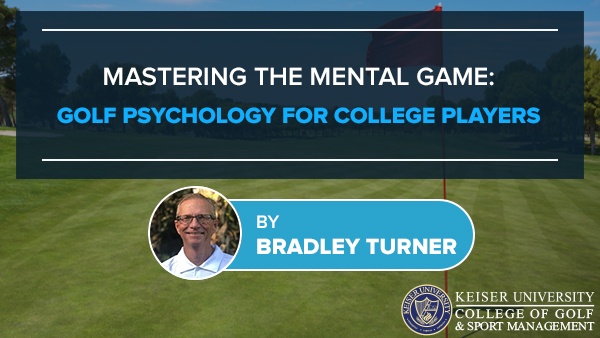Mastering the Mental Game: Golf Psychology for College Players

By Bradley Turner, Keiser University College of Golf Director of Online Golf Instruction – MBA, PGA
If you are a competitive golfer who enjoys challenging your skills against the golf course, the ability to stay focused on your own game and course strategy is paramount in performing to your potential. If you want to play well, then you must prepare mentally and physically before the round begins. The mental game of golf is a skill just like chipping and putting, which are golf skills. College players are at the initial stage of their skill development, so golf psychology can be a powerful ally. Learning to focus your mind on the right tasks is something college golfers must cultivate in their competitive careers. This article will highlight strategies you can implement into your own game. In short order, you will be on your way to mastering the mental game by preparing yourself mentally and physically to play your best.
Goal Setting for College Golfers: Mental Preparation
College golf has become highly competitive over the past decade, making it more challenging for athletes to achieve their playing goals. Positive thoughts and images of an excellent round of golf are normal for any competitive golfer. It is rare indeed that a player stands on the first tee with the belief that a horrendous round is about to unfold. However, sometimes optimism can overrule common sense when it comes to your expectations for the day. Your course strategy must match the game you have brought to the course. I suggest that you begin every round with moderate expectations and a conservative strategy. Even if you have been playing well, you don’t want to take risks early in the round that may get you moving in the wrong direction.
Set Process Goals for Your Round
If there is one tip college golfers can employ that can improve their golf psychology, it is to set process goals for the round. Replace scoring goals with process goals. These goals may include focusing on your pre-shot routine for the day. It might include a focus on being a great coach to yourself in the form of positive self-talk. Another excellent process goal is to visualize every shot with a clear picture of what you want the ball to do. Process goals are much better than concerning yourself with an outcome goal of shooting a certain score for your round.
The Role of Visualization in Golf Psychology
Visualizing is a great way to calm your mind and reduce negative emotions. When you are confronted with a difficult golf shot, the ability to visualize the desired outcome is critical to success. The brain is a wonderful partner in executing great golf shots. However, the brain can also imagine poor outcomes resulting in bad golf shots. Competitive golfers can improve their golf psychology by clearly deciding on the golf shot they are about to play. Committing to the desired outcome is a skill that few golfers have mastered, yet for the world-class golfer, visualization is a foundation for their performance.
Emotional Control: A Key Factor in Golf Psychology
If you listen to the post-round conversation of a group of college golfers, it is interesting how they like to share their misfortune on the course. Bad bounces and poor lies are all part of the game, yet these unfortunate aspects of the game can cause emotional distress. What the ball should have done does not matter in golf. It is always what the ball did. There is plenty of research that a perfectly struck putt from 10 feet will not go in every single time. Imperfections with the green conditions and the influence of the wind are a couple of examples of external factors that you cannot control. Emotional control begins by focusing on the things you can control: your pre-shot routine, your self-talk, and the reason why you are playing golf in the first place.
Focus Techniques for College Golfers: Staying in the Zone
Have you ever been over a golf shot and started thinking of the future? The proverbial “what ifs” never improve performance in any sport. Worrying about the future influences your ability to play in the present. One of my favorite techniques for staying in the right mental zone is to evaluate the process of execution. With every shot you hit in the round, you must accomplish only two tasks. First, commit to the shot you are about to play. Commitment implies a clear picture of your intentions, so visualize the intended ball flight. The second task is to trust your ability and make a confident golf swing. This game will also keep you concentrating on the now and stay in the moment.
Managing Pressure in Competitive College Golf Tournaments
College golf tournaments provide an interesting emotional experience for college players. The game of golf is essentially an individual against the golf course. In college tournaments, the team aspect can add additional pressure to the players. Playing for yourself is one thing, but playing for your teammates and your school can be a new experience for freshman golfers. Managing this pressure in competitive golf tournaments comes down to preparing for each shot to the best of your abilities and focusing on your own game.
Overcoming Challenges: Mental Strategies for Golfers
Ben Hogan was once quoted as saying, “The most important golf shot is the next one.” Composure in golf is an attribute of great tournament players and often the downfall of many college golfers. Focusing on the wrong things, like the triple bogey on the previous hole, will only frustrate you further. The ability to accept the outcome of all your golf shots without negatively influencing the next shot will take some mental discipline. However, the benefit of this mental strategy will be better decision-making on the golf course and a better overall performance.
As with all avid golfers, competitive college players love the game. Mastering the mental game of golf is a big step towards lowering your golf scores. When your golf performance becomes too important, the game can become frustrating and no longer fun. We all play the game for different reasons, but the primary reason should be the enjoyment of being outdoors with friends and testing your golf skills. If you can mentally work through the difficulties of the game and simply enjoy the challenge, golf can be fun.
Learn more!
Want more tips? If you want to take your game to the next level, contact our team at Keiser University’s College of Golf & Sport Management today. With our dedication and experience, together, we can elevate your game to new heights. Give us a call today at 888-644-4964.














